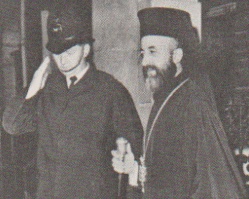No documents have yet emerged at the UK National Archives to confirm whether British intelligence blackmailed Archbishop Makarios, head of the Greek Orthodox church in Cyprus and first President of Cyprus from 1960 to 1977.
The allegation has been repeated several times, and the original sources seem to be two books: The Friends, a history of MI6 by the former Conservative MP Rupert Allason, writing under his pen name Nigel West; and The Perfect English Spy, a biography by Tom Bower of Sir Dick White, the only man ever to have headed MI5 (1953-56) and MI6 (1956-68).
Bower’s sources for this extraordinary story were Sir Dick White himself, and the former intelligence officer Julian Amery, who was a minister at the Colonial Office during the Cyprus crisis when MI6 targeted Makarios as part of a campaign against Greek Cypriot terrorism. (It’s not clear what sources were used for the similar allegation in West’s book, but they probably included both Amery again, and fellow Conservative MP and MI6 veteran Sir Stephen Hastings, who was one of the main intelligence officers involved in Cyprus.)

The crisis was resolved during negotiations at Lancaster House, London in February 1959. The notoriously difficult Archbishop Makarios had long been known to have ties to the EOKA terrorist organisation (though at times he was a factional rival of EOKA’s leadership), and for a time he was deported to the Seychelles by the British authorities. In 1959 Makarios was an important part of the negotiations, and it was feared he was about to torpedo a deal at the last minute.
It’s alleged that British officials (perhaps Amery himself) visited Makarios at his London hotel and presented him with a dossier concerning his homosexuality. This material had been collected during ‘Operation Sunshine’ a couple of years earlier, a successful British operation against Cypriot terrorists which resulted in the capture of their leader Giorgios Grivas.
The next morning Makarios withdrew all his objections and the deal was signed. Makarios had not only accepted a permanent Turkish presence in Cyprus, but also the stationing of two large British military bases on the island.
Several historians with expertise in intelligence matters were reminded of the Makarios case recently, when Sir Jeffrey Donaldson, former leader of the Democratic Unionist Party, resigned after he was charged with rape and other historical sexual offences.

No one should prejudice an ongoing criminal case by speculating as to the guilt or innocence of the accused, nor by identifying the alleged victims. The point here should not be to speculate as to Donaldson’s guilt or innocence. Especially in a case of this nature, none of us have a clue about that.
But there are far bigger questions involved.
Regardless of whether Donaldson is guilty or not, Northern Ireland voters are entitled to know whether Rishi Sunak’s ministers were aware of the allegations before Donaldson was persuaded at the end of January this year to put his name to the amended ‘Windsor Framework’, seen by many within his own party as a fundamental betrayal of the Union.
The entire raison d’être of Donaldson’s party ought to be maintenance of the Union. But the Donaldson deal accepts a border in the Irish Sea, dividing one part of the United Kingdom from the rest.
Evidence is stacking up suggesting that British intelligence had a long-term agenda of protecting Martin McGuinness, the IRA commander whose progress through the ranks of SF/IRA they sought to encourage, despite having easily sufficient evidence to send McGuinness to prison for a long time.
Would it really be surprising if dirty tricks were also used against the Unionist community, as part of a long process of betraying Ulster and creating a ‘United Ireland’, as desired both in Washington and Brussels?



